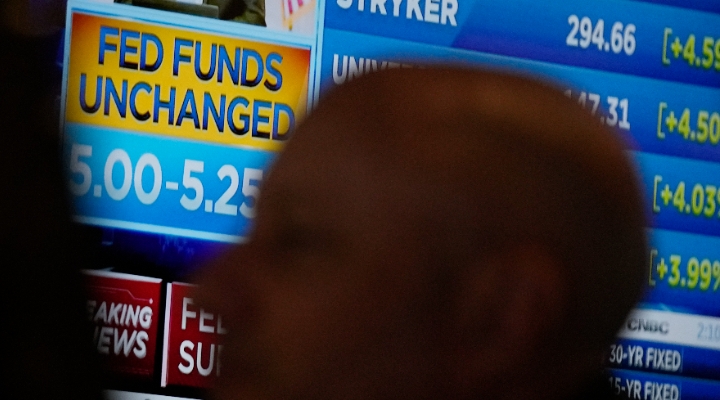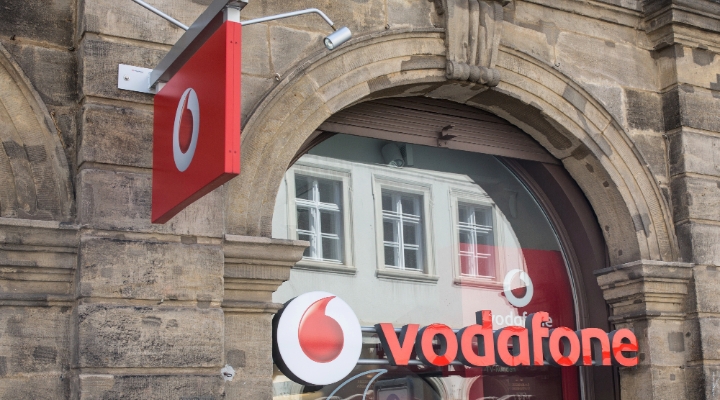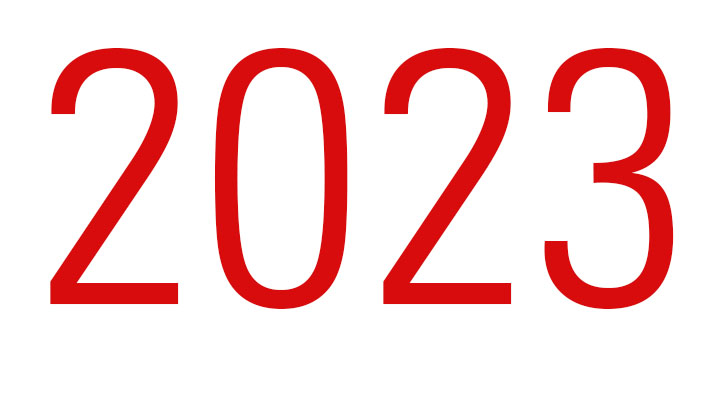
Prices are So Crazy Right Now
Global popstars don’t usual feature in economic analysis from major banks on the latest inflation statistics. But Danske Bank has said the ‘Beyoncé effect’ can be seen in Sweden’s inflation figures for May, after the Queen of Pop performed two shows in Stockholm as part of her world tour. The demand for hotel rooms, restaurant meals and tickets for the gigs helped drive up prices across Sweden to give a higher-than-expected inflation of 9.7% for the month. The bank’s economist said Beyoncé wasn’t the sole cause of stubbornly high prices – which had peaked at 12.7% at the end of last year – but had “added a little” to underlying trends. The BeyHive, as her fans are known, is clearly an economic force to be reckoned with.
Fed Pauses for Now
There was more optimistic economic news from across the Atlantic this week, with inflation easing and the Federal Reserve putting interest rates on hold — for now at least. In the US inflation now stands at just 4%, the lowest it has been since 2021, and the 11th consecutive month price rises have slowed. This more positive backdrop allowed the Fed to pause its historical rate-hiking campaign, which has seen it increase rates 10 times in a row. However, the accompanying statement suggests further hikes may be necessary this year. Will this pause herald a similar summer respite on increased borrowing costs over here, when the Bank of England’s Monetary Policy Committee meets next week? Most forecasters are not too optimistic, given there has been no similar sustained drop in inflation. This week, banks and building societies continued to push up the cost of fixed-rate mortgages suggesting the financial markets are certainly betting on another rate rise next Thursday.
Shell Drops Targets
Global net zero targets may be a little harder to achieve, with this week’s news that oil giant Shell appears to be dropping targets to cut oil production by 2030. The fossil fuel producer says output will be ’steady’ with it investing $40 billion in oil and gas production between now and 2035, compared to just $10 billion and $15 billion in ‘low carbon’ products. While this will disappoint many ESG investors and green activists, many shareholders won’t be complaining. At the same time Shell announced it is upping its dividend by 15%, commencing a share buy-back programmes and will also ensure that more of its cash flow is redistributed to shareholders in future. The ESG credentials of Shell may be a little tarnished, but it is clear the financial aspects of its black gold continue to shine.
AI – Actually, Don’t Panic
For a non-sentient being, Artificial Intelligence, has a lot of so-called ‘godfathers’ — and like all good fairy stories these don’t always agree on what is best for their nascent charge. This week, Professor Yann LeCun, a Meta scientist, and one of three ‘godfathers’ who won a Turing Award for their founding work on AI, attempted to dial down warnings made by his fellow award winners about the potential dangers of this technology. Previous warnings that AI posed a threat to humanity were ‘preposterously ridiculous’ he said, commenting that AI will neither permanently destroy jobs, take over the world or start killing humans within two years. While some tech experts and politicians calling for a brake on AI development, until the risks are better understood, LeCun takes the opposite view saying it would be a mistake to keep AI research “under lock and key”. A view that is no doubt endorsed by his employer, which is one of the biggest investors in the Metaverse.
Will Regulators Hang Up?
Vodafone and Three announced plans to merge this week, to form the UK largest mobile phone company, which would have more users than EE and 02. Of course, a merger of this size needs approval from the UK’s competition regulator – which isn't necessarily a foregone conclusion. In the past EU regulators blocked O2’s plans to take over Three, claiming it would reduce customer choice and raise prices. And the UK regulator has been flexing its muscles of late, blocking Microsoft’s plans to take over a rival games company (see below). Will it look to make cause similar controversy in the telecoms sector?
Game over for Activision Deal?
Is it now all over for Microsoft’s takeover of Activision Blizzard, makers of games like Call of Duty and Candy Crush? This week a judge granted US regulators the power to temporarily block the £56 billion acquisition, while further arguments are heard in court. This contentious deal has caused a split between competition regulators in different jurisdiction. UK regulators have already blocked the deal, although Microsoft is appealing. Meanwhile, EU regulators have approved the takeover after Microsoft made concessions to allow its games to be accessed on cloud streaming services. US regulators have argued that the deal would give Microsoft’s Xbox console exclusive access to Activision games, at the expense of other console giants Nintendo and Sony.
Twitter’s Press Relations Stink
Twitters relationship with the fourth estate has been somewhat adversarial since it was bought by Elon Musk. But it was surprising to learn this week that the press office’s automatic reply to journalists seeking comment is the ‘poo’ emoji! This nugget emerged after reports that Twitter was being sued by myriad music publishers, claiming it allows users to post music on the social media site without seeking appropriate permissions, or paying royalties. Members of the US National music Publishers’ Association are seeking damages of up $150,000 for 1,700 different songs, including tracks by Rihanna, Ed Sheerhan, and Beyoncé. For some investors this is certainly an interesting development, not least because the Sheerhan song, among others, is part of the song-writing catalogue owned by Hipgnosis, the specialist investment trust that invests in music rights.
WE Won’t Be Floating
Questions will continue to be asked about the attractiveness of London as a listing centre after WE Soda — the world’s largest producer of natural soda ash — pulled its IPO just two weeks after championing the London market. The firm blamed “extreme investor caution” which meant it was unlikely to achieve what it thinks should be a fair valuation for the firm. Demand for soda ash has risen, given its use in the manufacture of the glass used in solar panels. There has been concern about other fast-growing tech companies choosing to list in the US instead. However, it is not all doom and gloom for the London Stock Exchange, as at the end of the week the cross-border payments group CAB Payments announced it would be listing on the London market, potentially as early as next month.
Land of the Rising Share Prices
The Tokyo stock market is booming again with Japan’s main index, the Nikkei 225, passing 33,000 points, its highest level for 33 years. The market has risen by almost 30% this year, and 11.5% in the past month alone, outperforming US and UK markets by some considerable margin. Investor interest appears to be driven by perceived value, when compared to Western markets, and positive announcements from some of the largest companies listed on the Nikkei, including Toyota and tech firm SoftBank, which bought the formerly UK-listed ARM Holdings. However, UK investors with longer memories may still be cautious. There was considerable excitement about the Japanese market in the late 1980s, with the Nikkei peaking at just under 39,000 in 1989 before shares crashed. The index then remained significantly below this previous peak for decades, sliding to under 8,000 during the financial crisis.
Odey Oh Dear
Hedge fund Odey Asset Management, known for its bet against sterling prior to the Brexit referendum, is to be split up, following a series of misconduct allegations against its founder Crispin Odey. While Odey strongly denies the allegations, he was ousted from the business last weekend. Since then, a number of funds have been gated in a bid to stop outflows before it was announced the firm will be broken up to protect the interests of investors and staff. The case has highlighted the potential challenges faced by regulators when allegations arise about those running financial institutions, particularly when these allegations are primarily not concerning financial conduct. Morningstar has looked in more depth about the wider regulator repercussions as well as updating the status of individual Odey funds.




























